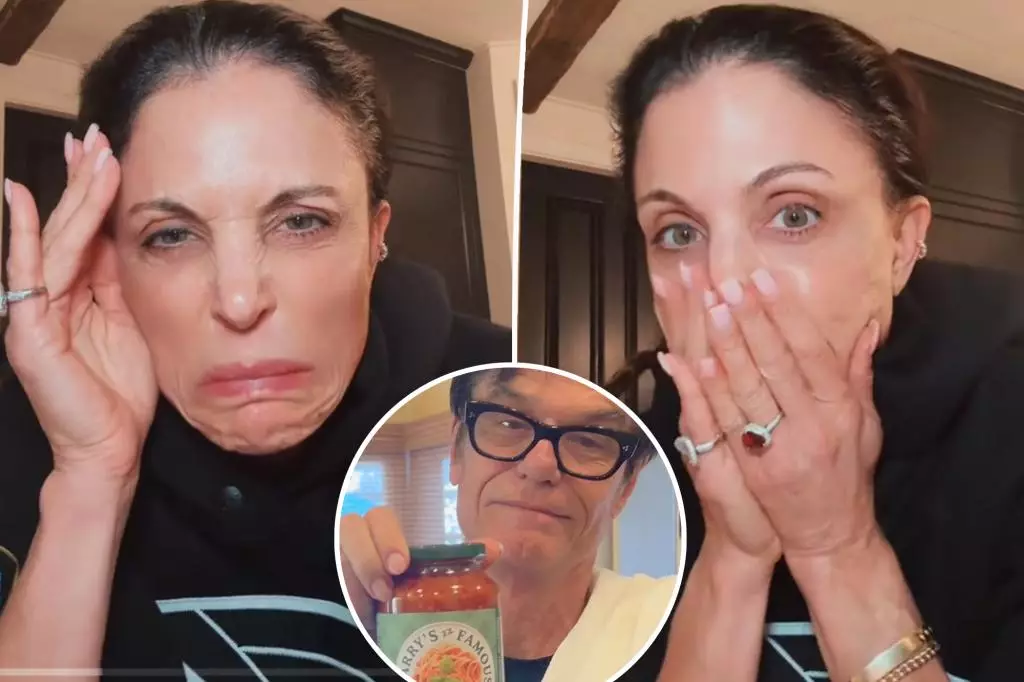Bethenny Frankel, the outspoken reality TV star and entrepreneur, recently stirred the pot—or rather the pasta sauce—during a blind taste test that featured none other than Harry Hamlin’s brand. As a former cast member of the “Real Housewives of New York City,” Frankel is no stranger to the spotlight, and her candid reviews have often drawn attention. In this instance, her biting critique of Hamlin’s sauce not only prompted laughter but also raised questions about celebrity brand ventures in the culinary world.
In a TikTok video that quickly garnered views, Frankel took part in a blind taste test that juxtaposed Hamlin’s rosemary red wine sauce against a jar of the well-loved Rao’s pasta sauce. Receiving the jar as part of a “beautiful” picnic basket, Frankel’s reaction was stark. She described Rao’s as “nice” but cringed dramatically after sampling Hamlin’s rendition. She exclaimed her disdain, crying, “No! I don’t know what that is!” and proceeded to cover her mouth in disbelief, creating a moment that is now etched in social media lore.
Frankel’s unfiltered assessment—expressed through expressions of horror—demonstrates a reality TV dynamic that often fuses humor with authenticity. Her gustatory experience was not merely about personal preference but also conveyed a larger narrative about the risks of celebrity branding. In an industry where personalities leverage their fame to create products, the true test lies in the quality of the offering. Frankel’s comedic discomfort emphasized that even the best intentions are sometimes eclipsed by less-than-stellar execution.
Following her initial, scathing review, Frankel received feedback from Amelia Gray Hamlin, daughter of the sauce’s creator. Amelia humorously suggested that Frankel should cook the sauce before making a final judgment. Undeterred, Frankel proceeded to heat the sauce up with pasta. However, her second attempt only amplified her original sentiment; she declared it “worse” and described the flavor as resembling “not great red wine.” This relentless criticism reflected Frankel’s commitment to honesty, even if it meant potentially offending another celebrity.
What makes this drama even more intriguing is the interplay between personal taste and the demands of the marketplace. Hamlin has touted his sauce as being crafted with “love and more love,” claiming it contains no preservatives and is made from high-quality ingredients like crushed tomatoes, red wine, and organic rosemary. Yet, the question persists: does the love behind the product compensate for its perceived lack of culinary merit? Frankel’s reluctance to sugarcoat her review shines a light on the unvarnished truth about taste—it’s subjective, and what works for one palate might fail miserably for another.
The Celebrity Cooking Phenomenon: Navigating Taste and Brand
This culinary face-off raises broader questions about celebrity endorsements in the food industry. With the likes of Hamlin venturing into the market, joining a league of stars attempting to turn their culinary aspirations into commercial success, the stakes are high. Yet, as Frankel pointed out in her humorous yet biting way, the reality is that “business is hard.” The pressure to please consumers while navigating the personal tastes of celebrity chefs can produce results that are not only humorous but also indicative of larger trends in consumer reaction to media-branded products.
With Hamlin’s sauce now presented as a topic of both interest and ridicule, it serves as a case study in the fragility of public perception. While Hamlin’s sauce may find its niche audience, Frankel’s reaction underscores a critical truth: even the most well-loved familiars can be met with indifference, or in this case, horror. This clash of culinary opinions is emblematic of a landscape where taste is king, and celebrity status doesn’t ensure culinary success.
In the realm of celebrity cookery, Bethenny Frankel’s brutal review of Harry Hamlin’s pasta sauce serves as both entertainment and an important lesson in authenticity. While Hamlin’s aspirations to share his culinary passion are commendable, Frankel’s unabashed critique holds a mirror to the volatility of public opinion in the celebrity branding sector. As for Hamlin, the challenge remains: how will he navigate the unyielding demands of taste and the marketplace? Only time will tell if he can whip up a flavor profile that resonates beyond viral moments into lasting appeal.

